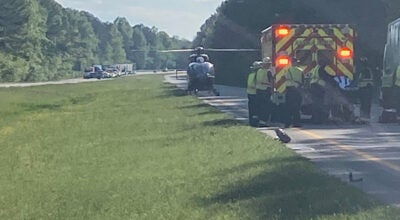Port officials pitch farmers
Published 10:46 pm Tuesday, November 29, 2011

J.J. Keever, senior deputy executive director for external affairs at the Virginia Port Authority, was the keynote speaker at the opening luncheon for the Virginia Farm Bureau Federation’s annual convention.
Virginia farmers and the Port of Virginia have a mutually beneficial relationship and can see increased benefits by working together more, Virginia Port Authority officials said during the Virginia Farm Bureau Federation’s annual convention.
Two port officials spoke during the first day of the convention at the Norfolk Waterside Marriott. The theme for this year’s convention is “Ag Trade: Growing Opportunities.”
“The Port of Virginia is the hometown port for Virginia farmers,” said Greg Edwards, director of external affairs for the Virginia Port Authority. “It’s close by, so why go somewhere farther away when you can utilize the port right here?”
Edwards spoke at an afternoon workshop on the port’s value to Virginia farmers. Earlier, J.J. Keever, senior deputy executive director for external affairs at the port authority, was the keynote speaker during the opening luncheon of the convention.
Keever said agricultural products are a staple for the port. The state’s agricultural and forestry exports totaled $2.24 billion in 2010, with top exports including soybeans, grains, pork, poultry, tobacco, wood products, fats and oils, cotton, seafood, fresh vegetables and animal hides.
“We’re moving Virginia products throughout the world,” Keever said.
Edwards said agricultural exports are on the rise, because it has become easier for farmers to export their products. Producers can put their goods in containers, rather than exporting higher volumes of their product.
“Instead of having to export 1,000 or 2,000 tons of a product, farmers can choose to fill two containers,” Edwards said. “That’s achievable and has made exporting products more appealing to farmers.”
Virginia’s top export markets include Canada, China, Morocco, Belgium, Indonesia, Venezuela, Mexico, Russia, Ireland and Japan.
However, challenges abound, especially when it comes to exporting Virginia products to China, Keever said.
Since mid-2007, China has banned the import of poultry from Virginia after a strain of bird flu was found in turkeys at a Shenandoah Valley farm. This year, China banned shipments of logs from Virginia after insects were found in multiple shipments.
“It really puts the Port of Virginia at a huge disadvantage,” said Keever, who estimated the ban on logs alone costs the port between 4,000 and 5,000 containers per month. “That’s a huge piece of business for the port. We’re just sort of stuck in the middle of this quagmire.”
Gov. Bob McDonnell and members of Congress have been working to resolve the issue, Keever said. A visit from Chinese officials has been postponed several times but now is tentatively scheduled for March.
“We have the support of the highest levels of this administration,” Keever said.
Edwards told workshop participants that the Virginia Department of Agriculture and Consumer Services can help them find buyers for their products, and the Port of Virginia can help them move it.
“We have outpaced other ports on the East Coast,” Keever said. “We think we have greater ability to move that freight.”






